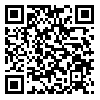Accepted article
Back to the articles list |
Back to browse issues page
Hassan Yazdanian 

 , Zohre Bagheri Rekhne
, Zohre Bagheri Rekhne 

 , Ariana Soltani
, Ariana Soltani 

 , AmirMohammad Vakili
, AmirMohammad Vakili 

 , Mohammad Reza
, Mohammad Reza 

 , Sajjad Zareii
, Sajjad Zareii 

 , Mohsen Vahedi
, Mohsen Vahedi 

 , Talieh Zarifian *1
, Talieh Zarifian *1 




 , Zohre Bagheri Rekhne
, Zohre Bagheri Rekhne 

 , Ariana Soltani
, Ariana Soltani 

 , AmirMohammad Vakili
, AmirMohammad Vakili 

 , Mohammad Reza
, Mohammad Reza 

 , Sajjad Zareii
, Sajjad Zareii 

 , Mohsen Vahedi
, Mohsen Vahedi 

 , Talieh Zarifian *1
, Talieh Zarifian *1 


1- , t.zarifian@yahoo.com
Abstract: (60 Views)
Joint attention (JA) deficits are frequently one of the earliest indicators of Autism Spectrum Disorder (ASD), making them a crucial focus for early interventions. Virtual Reality (VR) technology has emerged as a promising tool in this area, offering immersive environments that could enhance JA skills in children with ASD. This study protocol outlines a randomized controlled trial designed to assess the effectiveness of a VR-based intervention for improving JA skills in school-aged children with autism. The trial will involve children aged 6 to 12 years, who will be randomly assigned to either a treatment group, receiving VR therapy in addition to standard interventions, or a control group, receiving sham therapy plus standard interventions. The VR intervention consists of specialized scenarios delivered through a VR headset, with JA skills and social-communication behaviors being the primary and secondary outcomes, respectively. JA skills will be measured using the Childhood Joint Attention Rating Scale (C-JARS) and a cross-validation tool within the VR environment, while social-communication behaviors will be assessed using the Gilliam Autism Rating Scale, Third Edition (GARS-3). The study began recruiting participants in October 2023, with results expected by early 2025. This trial aims to provide valuable insights into the potential of VR as a supplemental therapy for enhancing JA skills and improving social-communication behaviors in children with ASD.
Keywords: Autism Spectrum Disorder, Initiating Joint Attention, Joint Attention, Responding to Joint Attention, Social-communication Skills, Virtual Reality
Type of Study: Original Research Article |
Subject:
Rehabilitation
Received: 2025/07/26 | Accepted: 2025/09/15
Received: 2025/07/26 | Accepted: 2025/09/15
| Rights and permissions | |
 |
This work is licensed under a Creative Commons Attribution-NonCommercial 4.0 International License. |



